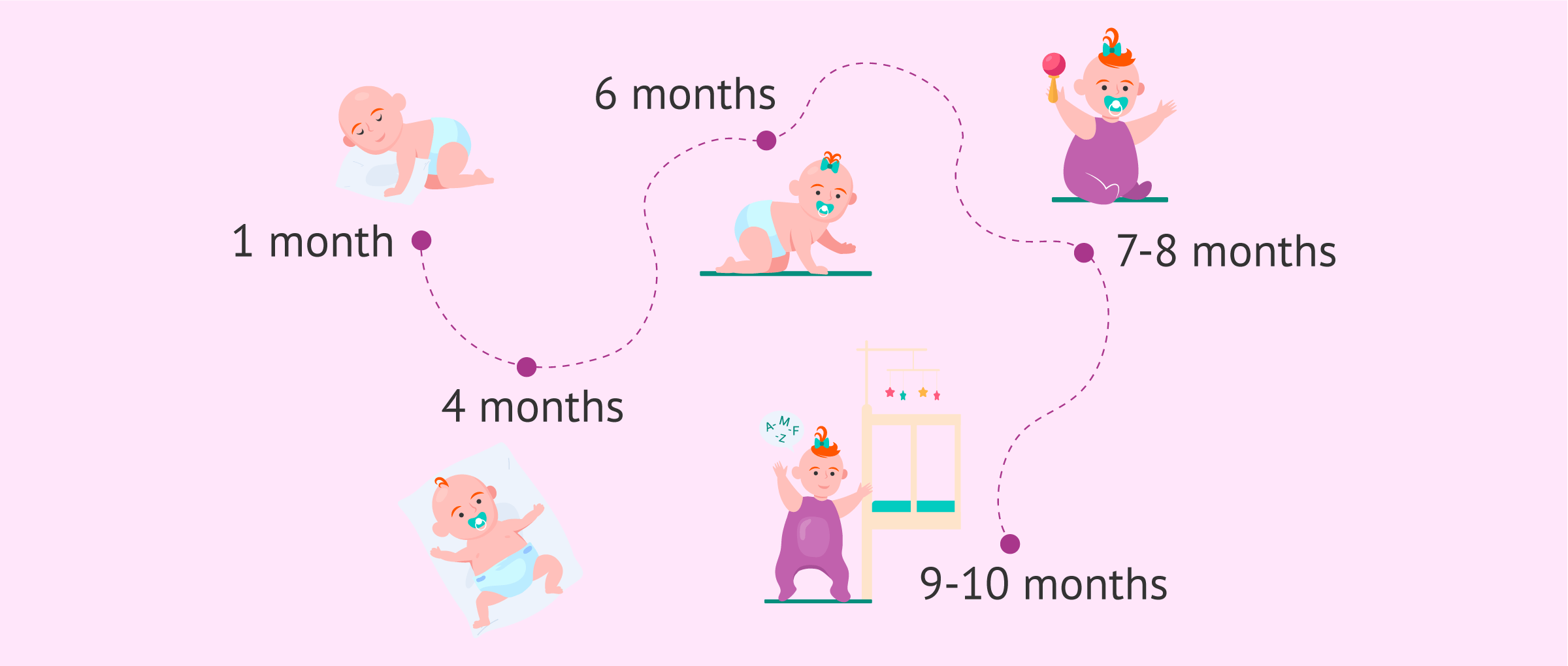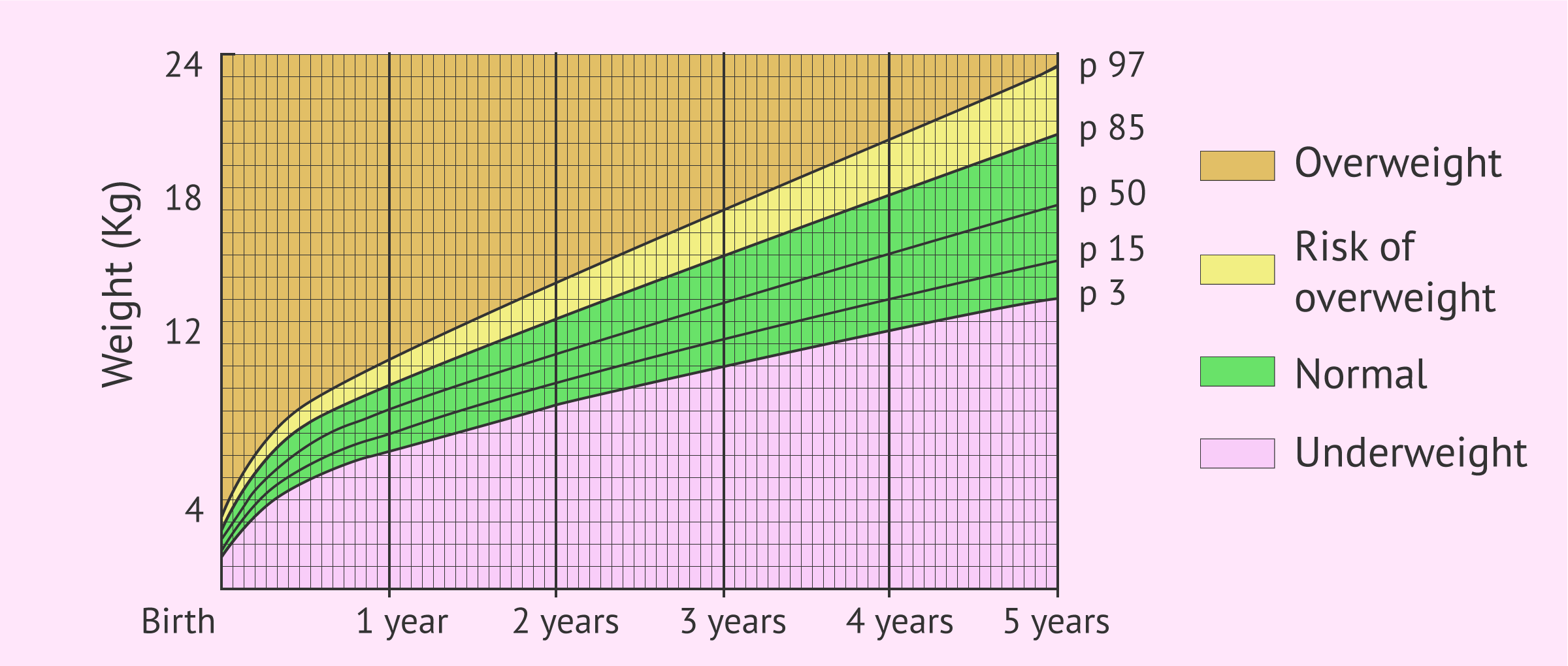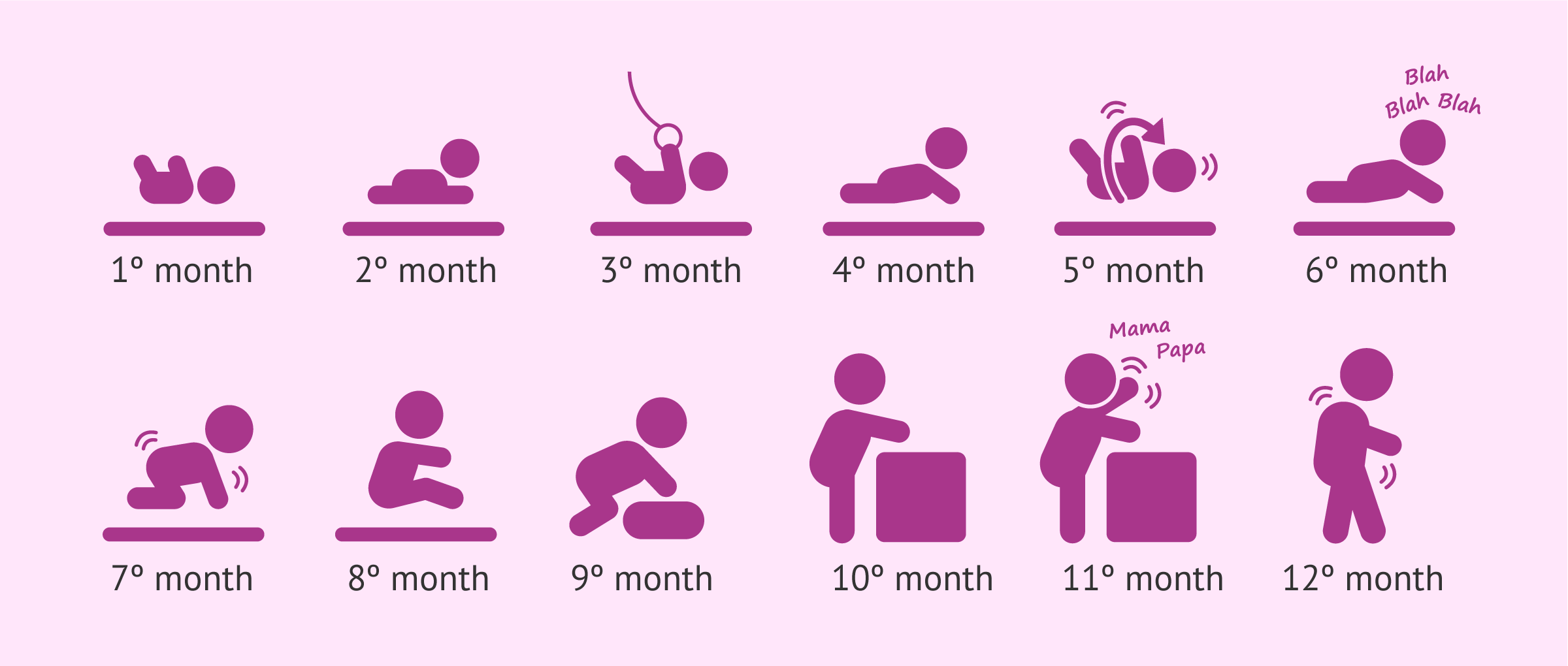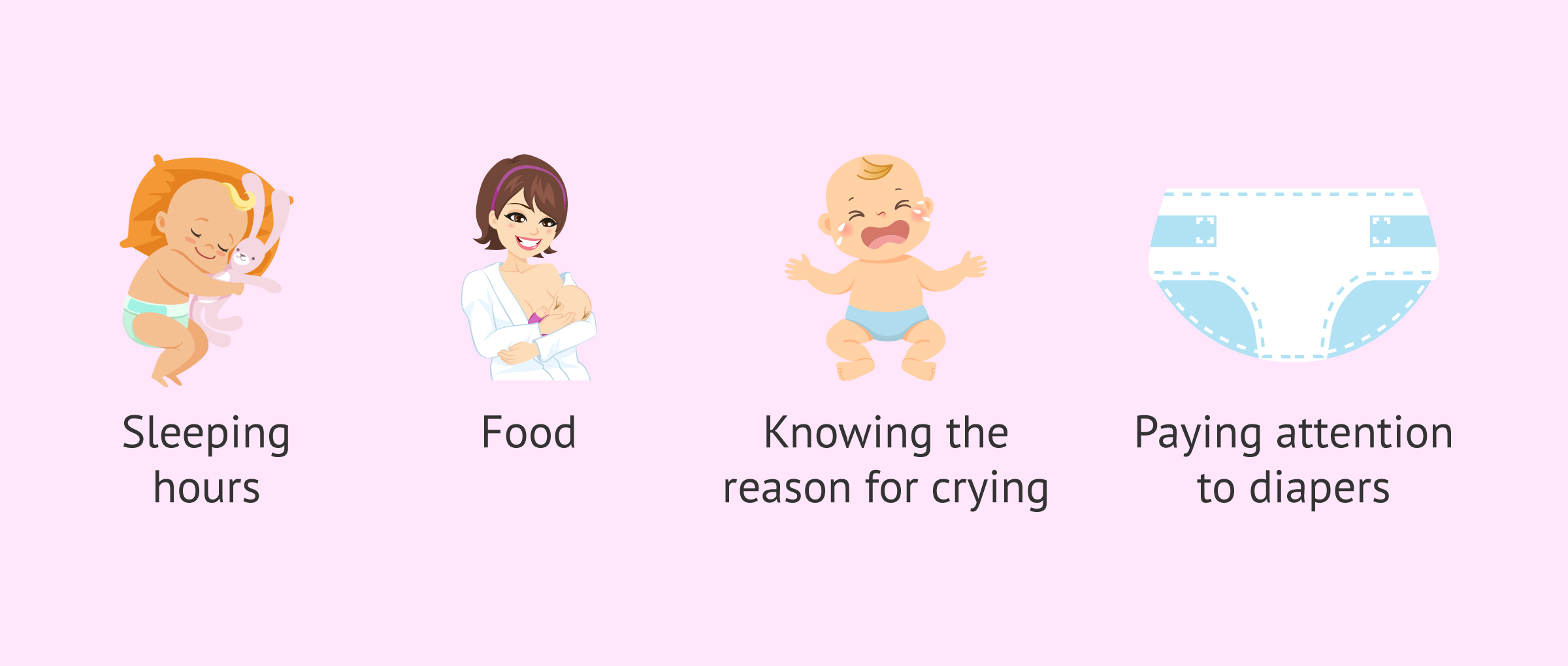The first months of a newborn or neonate's life are not easy for parents, especially first-time parents, because the baby is totally dependent and therefore needs your full attention. Crying a lot, not sleeping, gas, not pooping, restlessness... these are some of the main questions asked by parents after the birth of their baby.
In this first stage of life, the baby grows at an accelerated pace, basing its development and behavior on instincts and reflexes that it has been acquiring from inside the mother's womb.
The first months of a baby's life are essential, as a very important part of his physical, mental, social and emotional development takes place.
Provided below is an index with the 6 points we are going to expand on in this article.
- 1.
- 1.1.
- 2.
- 3.
- 3.1.
- 3.2.
- 3.3.
- 3.4.
- 3.5.
- 4.
- 4.1.
- 4.2.
- 4.3.
- 4.4.
- 4.5.
- 4.6.
- 5.
- 6.
Growth and learning
After having spent nine months in the womb, the birth of the baby is the entrance to a new world completely unknown to him. He does not know the environment or how to behave in it.
Although they need to learn to perform a multitude of tasks, newborns up to about 4 years of age have a learning capacity far superior to that of adults.
Therefore, although its behavior is initially instinctive, it will gradually learn to live in its new environment. They are at a very receptive stage where any small gesture, sound, color or movement allows them to learn one more thing about the situation and the surrounding environment.
During its first year, the baby experiences a great deal of growth. We must take into account that there will be moments of great changes and others in which practically no progress is observed in its development.
It is important not to be alarmed or worry excessively at these times when the child does not evolve as quickly as in other times, because, although it may not seem so, the baby is acquiring new skills.
Growth charts
It is recommended not to compare the evolution of the newborn with the growth of siblings, cousins or other people's children. Each baby develops differently and should not be forced to walk or talk if he or she is not yet confident.
For example, if a child is forced to walk when he is not yet ready and falls, he may become fearful and will take longer to try again. Each child has a different rate of growth and development.
Despite this, there are so-called growth charts that compare measurements such as weight, length or head size with universal average means of children of similar conditions, i.e. of the same age and sex.
By comparing your baby's measurements to these averages, a chart is created that helps the doctor determine if your baby is following the healthy growth pattern.
However, as we have already indicated, parents should not be overly concerned or obsessed with percentiles, as it is not mathematical. The important thing is that the baby evolves appropriately over time and does not reach extreme values of weight or height.
Infant development by stages
As the baby's development progresses after birth, it begins to interact with people and develop new habits, thus stimulating its intelligence. Although he is still very young, his personality is beginning to be forged, so through his behavior you can begin to see what he will be like when he grows up.
As we can see in the image above, as the newborn grows, its basic abilities and skills are formed:
- Physical: gross motor skills (walking, sitting, holding the head...) and fine motor skills (scratching, holding a glass...) are developed.
- Cognitive: even if a baby does not speak or cannot understand your words, it does pick up on your emotions or your attitude. In addition, his observation skills and hearing help him to internalize important aspects such as trust, time, relationships...
- Language: there are babies who start talking early and others who only make small sounds with their mouths and take longer to utter a clear word. It is important to stimulate and teach language to babies from the beginning of their lives, talking to them in a clear way and stimulating their learning with games adapted to each age.
- Social: the environment in which the baby grows is crucial for its proper development. Physical contact (caresses, kisses, hugs...), emotional support and the affection offered by family members to the baby will help him/her to develop social skills and to develop gradually in the world around him/her.
There are several exercises that can be performed with the baby to stimulate the development of his skills in the first months of life. If you are interested in this topic, we recommend you to visit the following article: Early stimulation exercises for babies from 6 to 12 months.
Baby care
As we have already mentioned, in the first days and months of life, the newborn is totally dependent and needs all the care of its parents.
There are some aspects to which parents should pay special attention so that their baby's development is adequate. Some of them are detailed below.
Sleeping hours
The newborn does not have the circadian rhythm of adults (ability to distinguish day from night). Generally, babies sleep at all times and only wake up to eat or in case of pain or discomfort such as gas or a dirty diaper.
This is something that changes a lot from one baby to another. It will depend to a large extent on the diet. Some babies sleep for many hours at a time and others need to feed more often, so they will wake up more frequently.
Food and beverages
The baby's feeding should be constant in the first days. In fact, it is common for the baby to cry for hunger every two to three hours. However, over time, the shots will be spaced out.
If possible, breastfeeding is recommended because breast milk provides antibodies that strengthen the baby's defenses. In this case, it is essential to monitor her weight to make sure she is getting enough milk. Unlike a bottle, we cannot know if the baby is drinking milk with certainty or the exact amount he or she is expressing.
For the first few days it is normal for the baby to fall asleep while breastfeeding. This occurs because it is a great effort for her to express milk from the breast and, therefore, she gets tired. If the neonate's medical check-ups detect a delay in growth due to problems with breastfeeding, the doctor will recommend substituting it or combining it with artificial breastfeeding.
If you want more information about breastfeeding, I recommend you to consult this link: Artificial or natural breastfeeding.
Crying
Many mothers, especially new mothers, are frightened because their baby cries a lot. However, crying is not always a sign of alarm. We must keep in mind that crying is his only way of expressing himself, so he can cry for anything: hunger, gas, uncomfortable position, dirty diaper, burp, etc.
Knowing why a newborn cries is not easy, but over time, parents will learn to recognize the cause of the crying and provide the right solution to stop the baby from crying.
The diaper
It is necessary to keep an eye on diapers. If a baby cries, it may be because he is dirty and uncomfortable. The neonate is incontinent, has not yet learned to control the sphincters and does not deposit urine in the bladder.
When the baby reaches an age between 18 and 24 months, he or she should learn to go to the bathroom without a diaper.
Health
Monitoring your baby's health is important for a complete and proper development. It is crucial to follow doctors' instructions and pay special attention to unusual signs that may be indicative of an illness, such as unusual crying, abnormal pooping, elevated temperature, strange behavior or attitude, etc.
It is also essential to have all the required check-ups, follow the vaccination schedule and not take any medication without a detailed prescription from the specialist.
FAQs from users
How to prevent the baby from slipping while bathing?
It is usual to place the head and upper part of its trunk on the forearm, holding either its shoulder or the lower part of its trunk with your hand. This leaves the other hand free to caress and sponge him, gently cleaning his little body.
As you can see, the hand that holds the baby is the one that holds his head and shoulders, so you must put it in a position that allows you a strong grip, without hurting him and without making him uncomfortable.
Is it normal for a 7-month-old baby to be crawling?
7 months is an age when many babies begin to crawl. His bones are already stronger and therefore he can hold himself in the crawling position. In any case, it is important to keep in mind that not all babies crawl and not all crawl in the same month.
In what month does the baby sit up?
Sitting is the fact that the baby is able to sit up independently. Most babies achieve this between 6 and 7 months, although some take a little longer to be able to sit up without their parents' help.
Why is my baby yellow, is it dangerous?
When the newborn's skin is somewhat yellowish, it is possible that it is jaundice, so it is essential to consult a doctor. Jaundice is quite common and in mild cases it resolves within a few days of starting medical treatment.
The baby's skin turns yellow due to an accumulation of bilirubin in the blood. Direct sunlight is usually enough to solve this problem, although it is important not to do anything until the doctor analyzes the problem and tells you what to do.
Up to what age should I put the "baby on board" sign in the car?
Generally, such signs are used until the baby is about 2 years old or so. In any case, it is not mandatory.
What is the normal weight of a 5-month-old baby?
The weight of a 5-month-old baby is usually between 5.5 and 7.5 kg. However, it will depend on the child's birth weight and how the child is developing. Some children grow more slowly and others more quickly. The important thing is that the doctor, based on the growth charts, will indicate if this is adequate.
We make a great effort to provide you with the highest quality information.
🙏 Please share this article if you liked it. 💜💜 You help us continue!
References
Chantal Lau. Development of Suck and Swallow Mechanisms in Infants. Ann Nutr Metab. 2015;66 Suppl 5(0 5):7-14. doi: 10.1159/000381361. Epub 2015 Jul 24 (View)
Helen L Long, Dale D Bowman, Hyunjoo Yoo, Megan M Burkhardt-Reed, Edina R Bene, D Kimbrough Oller. Social and endogenous infant vocalizations. PLoS One. 2020 Aug 5;15(8):e0224956. doi: 10.1371/journal.pone.0224956. eCollection 2020 (View)
Jacek Debiec, Regina M Sullivan. The neurobiology of safety and threat learning in infancy. Neurobiol Learn Mem. 2017 Sep:143:49-58. doi: 10.1016/j.nlm.2016.10.015 (View)
Ravi Prakash Upadhyay, Sunita Taneja, Tor A Strand, Halvor Sommerfelt, Mari Hysing, Sarmila Mazumder, Nita Bhandari, Jose Martines, Tarun Dua, Patricia Kariger, Rajiv Bahl. Early child stimulation, linear growth and neurodevelopment in low birth weight infants. BMC Pediatr. 2022 Oct 8;22(1):586 (View)
FAQs from users: 'How to prevent the baby from slipping while bathing?', 'Is it normal for a 7-month-old baby to be crawling?', 'In what month does the baby sit up?', 'Why is my baby yellow, is it dangerous?', 'Up to what age should I put the "baby on board" sign in the car?' and 'What is the normal weight of a 5-month-old baby?'.





